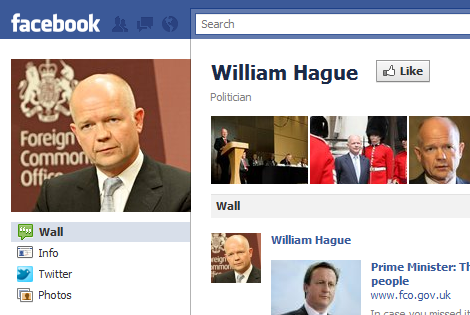 William Hague is an unlikely sort of technophile. Truth be told, for all his strengths
he simply does not look like a signed-up member of the Twitterati. His history-dripping, gold-covered office in King Charles Street is about as far away from the internet-enabled Google office as
you can get.
William Hague is an unlikely sort of technophile. Truth be told, for all his strengths
he simply does not look like a signed-up member of the Twitterati. His history-dripping, gold-covered office in King Charles Street is about as far away from the internet-enabled Google office as
you can get.
But the Foreign Secretary has just opened a Facebook profile – and garnered a thousand friends or so in a few days. Ironically, none of his staff can see his family snapshots, his “likes” or who he chooses to poke – as access to Facebook is limited on the Foreign Office IT network.
How this foray onto Facebook will end up remains to be seen. Ed Miliband’s Twitter experience was famously ill-fated. The Foreign Office, which recently revamped its website, has struggled with how to use the internet.
The best example of the department’s travails may have been its discussions a few years ago about establishing a British embassy in Second Life. The Foreign Office blogs are informative and show British diplomats for what they are – dedicated and articulate people. But anything that may be marginally interesting is weeded out through a process of self-censorship.
And herein lies the paradox which the Foreign Secretary’s Facebook profile has brought to the fore. Under a leader that embraces technological change, in a government that is keen to leverage technology to improve policy-making – opening it up, creating greater participation, and overcoming erstwhile bureaucratic problems – the Foreign Office is probably the government department which, after the Ministry of Defence, is least convinced about the value of the internet in improving its work, and least interested in it.






Comments